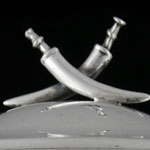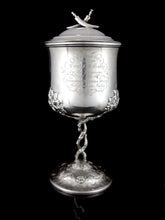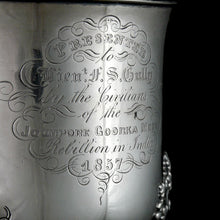An Indian Mutiny Gurkha Presentation Cup and Cover, 1857
Adding product to your cart
Height: 18.5cm (7.25in)
Silver cup and cover, the bowl engraved with foliate scrollwork and bearing presentation inscription ‘Presented / to / Lieut. F.S. Gully / by the Civilians /of the / Jounpore Goorka Mess / Rebillion [sic] in India / 1857’ ‘, supported on stem modelled as intwined vines rising from a naturalistically modelled base, the cover with crossed kukris finial.
Captain Francis John Slade Gully (1828-1864) was the son of a clergyman and a member of an old Cornish family, Gullly of Trevennen. He was admitted to a cadetship in the East India Company’s Bengal Army and proceeded to India in the 1843-44 season. At the time of the outbreak of the Mutiny at Meerut in May 1857 he was assigned to the 31st Bengal Native Infantry - one of the few regiments of the Bengal Army that remained loyal.
Read more
In December 1857 he was attached to the Goorka (or Gurkha) battalions under the overall command of the shrewd Nepalese Prime Minister Maharaja Jung Bahadur Rana, whose decision to support the British was based on knowledge acquired during a diplomatic mission to England in 1850-51 and his pledge of allegiance in person to Queen Victoria. Despite his initial offer of help being declined, Jung Bahadur held his troops in readiness on the Nepalese frontier. As the mutiny turned into a general uprising, Lord Canning relented and gladly accepted Jung Bahadur’s offer of eight battalions of Gurkhas under Nepalese officers who were dispatched to co-operate with British forces engaging rebels inAzimghur and Jounpore districts.
In December 1857 the Gurkhas were incorporated into Jounpore Field Force, which comprised H.M’S 97th Foot, under Brigadier-General Thomas Harte Franks, and took part in actions at Misrutpore and Chanda, where Muhammad Yar Khan, the chakladar (revenue officer) of Oudh, was engaged with a force of 5,000 men and five guns; at Ummeerpore, Sultanpore, and afterwards at the seige and capture of Lucknow in March 1858. The civilians referred to on the present cup were possibly members of the Bengal Civil Service who were similarly attached to Gurkha forces as volunteers. Gully, who was favourably mentioned in Franks’ despatch dated ‘Camp, Mahomed Bagh, before Lucknow on 12 March 1858 (London Gazette 31.3.1858), later served as a brigade major in the Saugor Field Division in the Central India campaign. He returned to England after the Mutiny and married into the Knatchbull family. He died at Calcutta in 1864.






